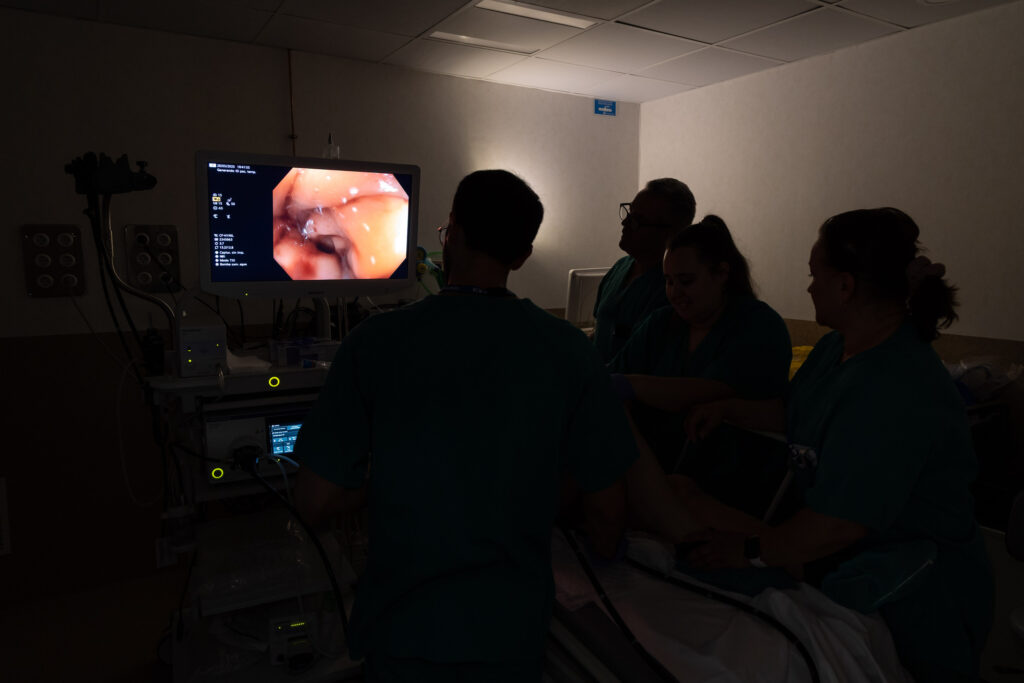Advanced digestive endoscopy specialized in cancer
What is an advanced digestive endoscopy specialized in cancer?
Advanced digestive endoscopy specialized in cancer refers to a set of endoscopic techniques that go beyond conventional endoscopy and are used for the detection, diagnosis, staging, and treatment of cancer in the digestive tract (esophagus, stomach, duodenum, colon, and rectum). These advanced techniques allow for more detailed visualization of lesions, obtaining more precise biopsies, and performing minimally invasive therapeutic procedures to remove or destroy cancerous tissue.
What is this diagnostic test used for?
Advanced digestive endoscopy specialized in cancer is used for:
- Early cancer detection: Allows for the detection of precancerous lesions or cancers in early stages, when they are easier to treat.
- Accurate diagnosis: Allows for obtaining high-quality biopsies to confirm the cancer diagnosis and determine its type and grade.
- Cancer staging: Helps determine the extent of the cancer and whether it has spread to lymph nodes or other organs.
- Minimally invasive treatment: Allows for performing therapeutic procedures to remove or destroy cancerous tissue without the need for open surgery.
- Post-treatment monitoring: Allows for monitoring treatment response and detecting cancer recurrence.
Benefits of high technology in advanced digestive endoscopy
Advanced digestive endoscopy specialized in cancer offers a series of key benefits thanks to the technology it uses:
- Chromoendoscopy: Uses special light filters or dyes to highlight mucosal features and improve the detection of precancerous lesions.
- Confocal endomicroscopy: Allows for real-time microscopic imaging of the mucosa, which helps differentiate between benign and malignant lesions.
- High-resolution endoscopy: Provides high-definition images that allow for more detailed visualization of lesions.
- Endoscopic ultrasound (EUS): Combines endoscopy with ultrasound to obtain images of the digestive tract and surrounding organs, which helps stage cancer and guide biopsies (tissue samples).
- Endoscopic mucosal resection (EMR): Allows for the removal of precancerous lesions or early-stage cancers from the mucosa of the digestive tract.
- Endoscopic submucosal dissection (ESD): Allows for the removal of larger or more complex lesions from the submucosa of the digestive tract.
- Radiofrequency ablation (RFA): Uses radiofrequency energy to destroy cancerous tissue.
- Photodynamic therapy (PDT): Uses a photosensitive drug and special light to destroy cancerous tissue.

How is the procedure performed?
The procedure for this diagnostic test varies depending on the technique used and the location of the cancer:
-
Preparation:
You will be asked to follow a special diet and take a laxative to cleanse the colon before the colonoscopy. It is important to inform your doctor about any allergies you have and about all medications you are taking, including over-the-counter drugs and supplements. You will be asked to fast for at least 6 hours before the procedure.
-
During the test:
You will be given sedation or general anesthesia to keep you calm during the procedure. An endoscope (a thin, flexible tube with a camera at the end) will be inserted through the mouth or anus and guided through the digestive tract. Images of the mucosa will be taken, and biopsies will be performed if necessary. If a therapeutic procedure, such as EMR or ESD, is to be performed, special instruments will be used to remove or destroy cancerous tissue.
-
After the test:
You will be monitored in the recovery room until you are fully awake. You may experience some mild side effects, such as sore throat, abdominal bloating, or gas. These side effects usually disappear quickly. You will be given instructions on how to care for the treated area and what signs of complication to watch for.
Recommendations for the test
Remember that it is important to follow these recommendations to ensure the quality of the study and your comfort:
- Follow preparation instructions: Carefully follow all preparation recommendations provided by your doctor or hospital staff.
- Report allergies and medications: It is important to tell your doctor about any allergies you have and about all medications you are taking, including over-the-counter drugs and supplements.
- Arrange transportation: You will need someone to drive you home after the procedure, as you will not be able to drive or operate heavy machinery for at least 24 hours due to sedation or anesthesia.
- Follow post-operative instructions: Carefully follow all post-operative instructions provided by your doctor or hospital staff.
Are there any risks?
Advanced digestive endoscopy specialized in cancer is generally safe, but like any medical procedure, it has some minimal risks to consider:
- Bleeding: There may be bleeding at the biopsy site or therapeutic procedure site.
- Perforation: In rare cases, the endoscope may perforate the wall of the digestive tract.
- Infection: There is a risk of infection at the biopsy site or therapeutic procedure site.
- Reactions to sedation or anesthesia: Allergic reactions or complications related to sedation or anesthesia may occur.
For your test to proceed smoothly, we ask that you arrive in advance of your scheduled time. This will allow us to complete the necessary administrative and clinical preparation.
Before the test, we will provide you with the Informed Consent form, a document with important information that you must read and sign.
If your appointment is for a Magnetic Resonance Imaging (MRI), it is crucial that you inform us about the presence of pacemakers, metallic objects, prostheses (including dental), tattoos, or medication infusion devices, such as insulin pumps.